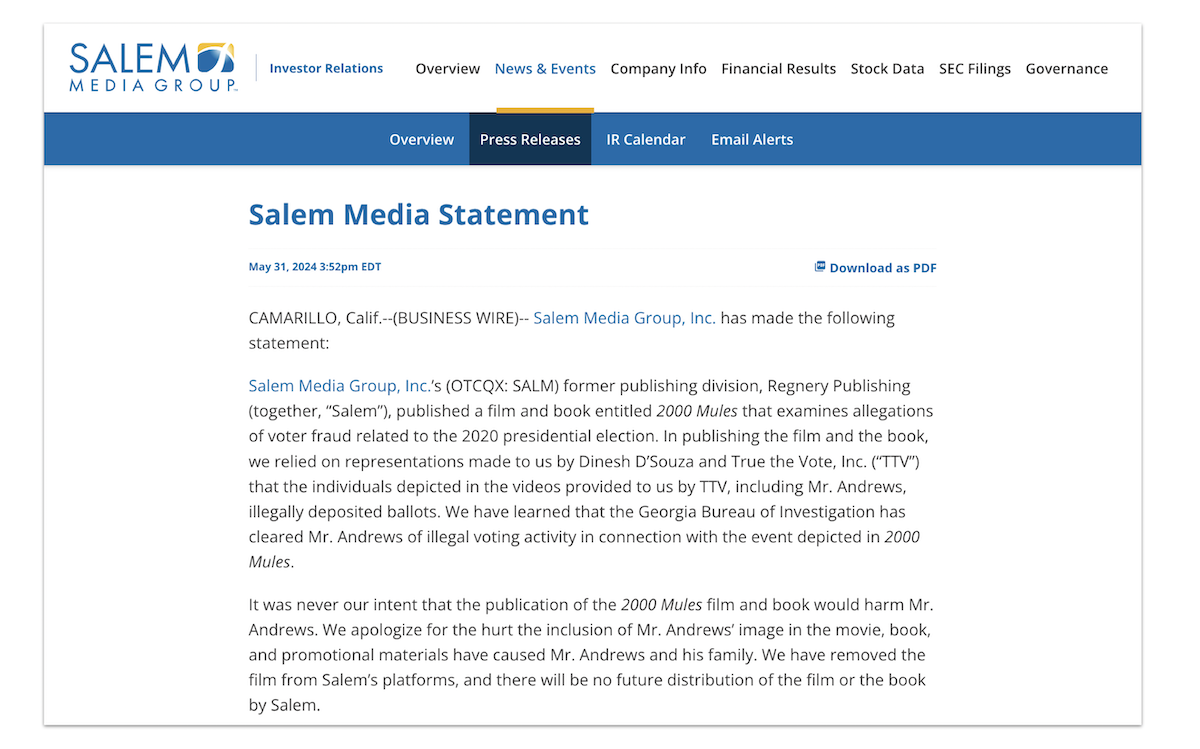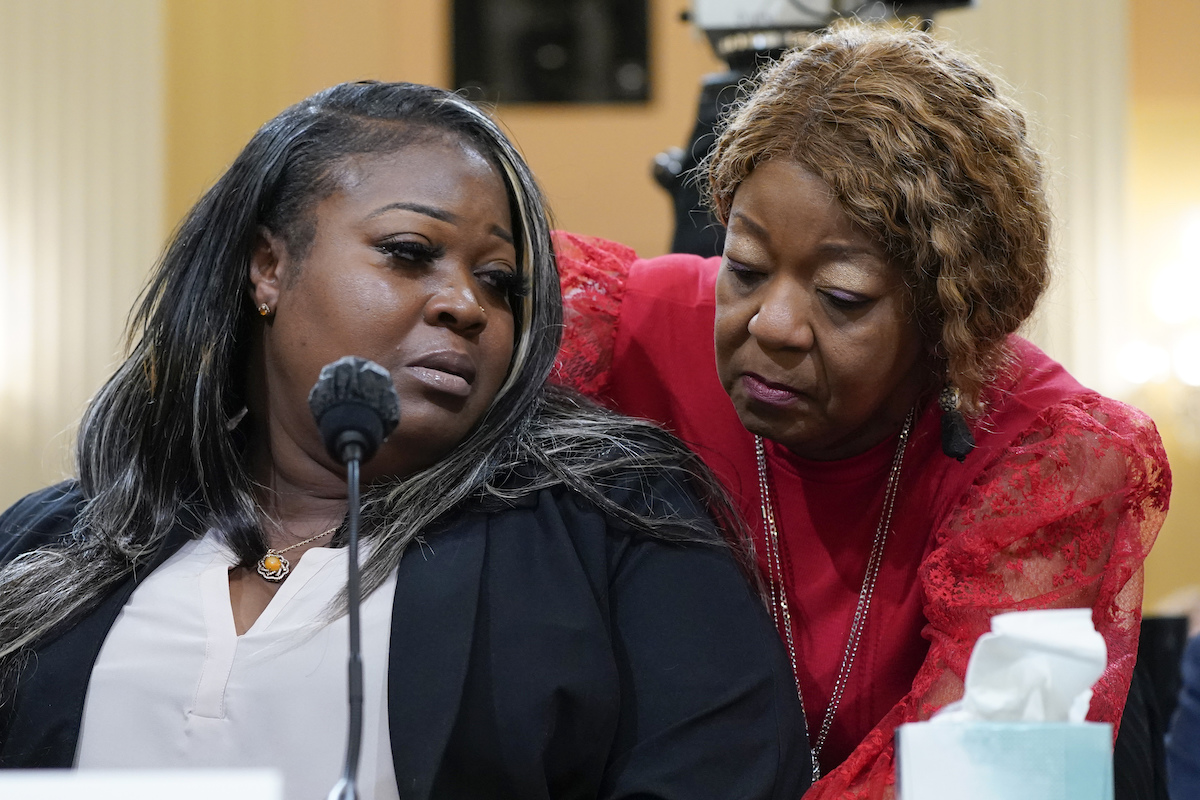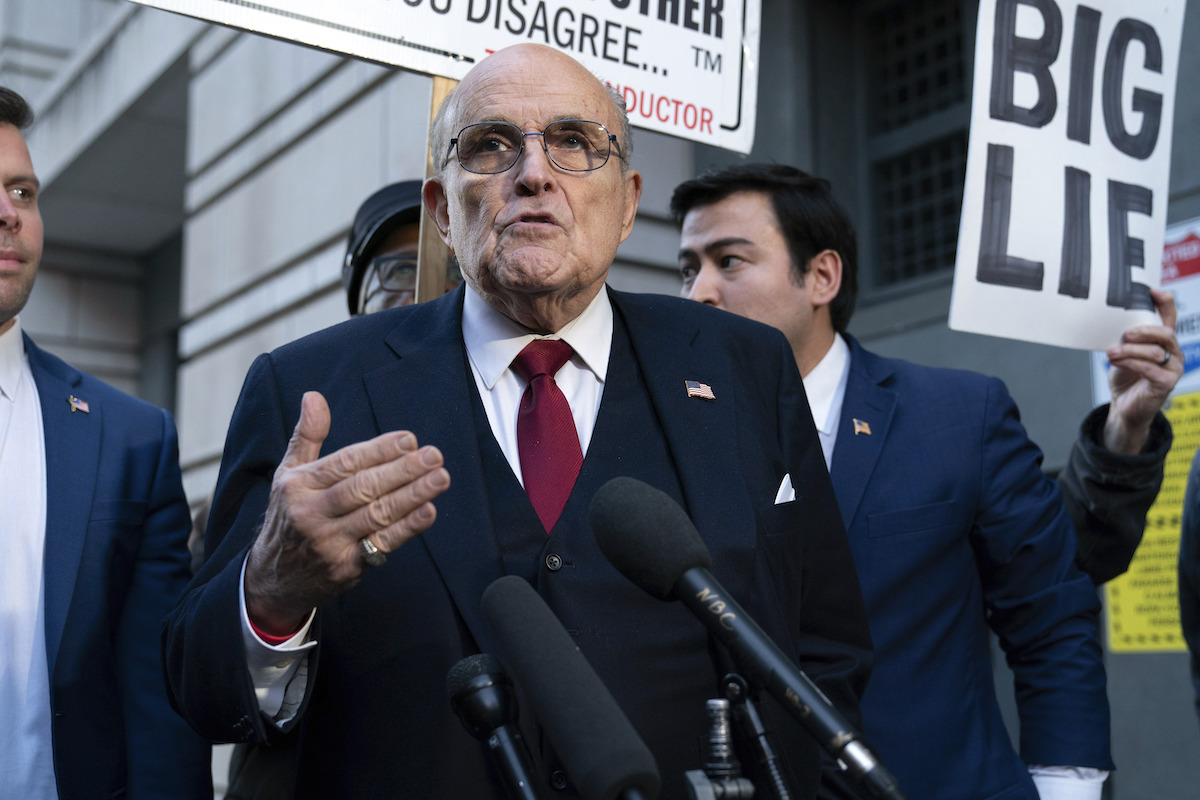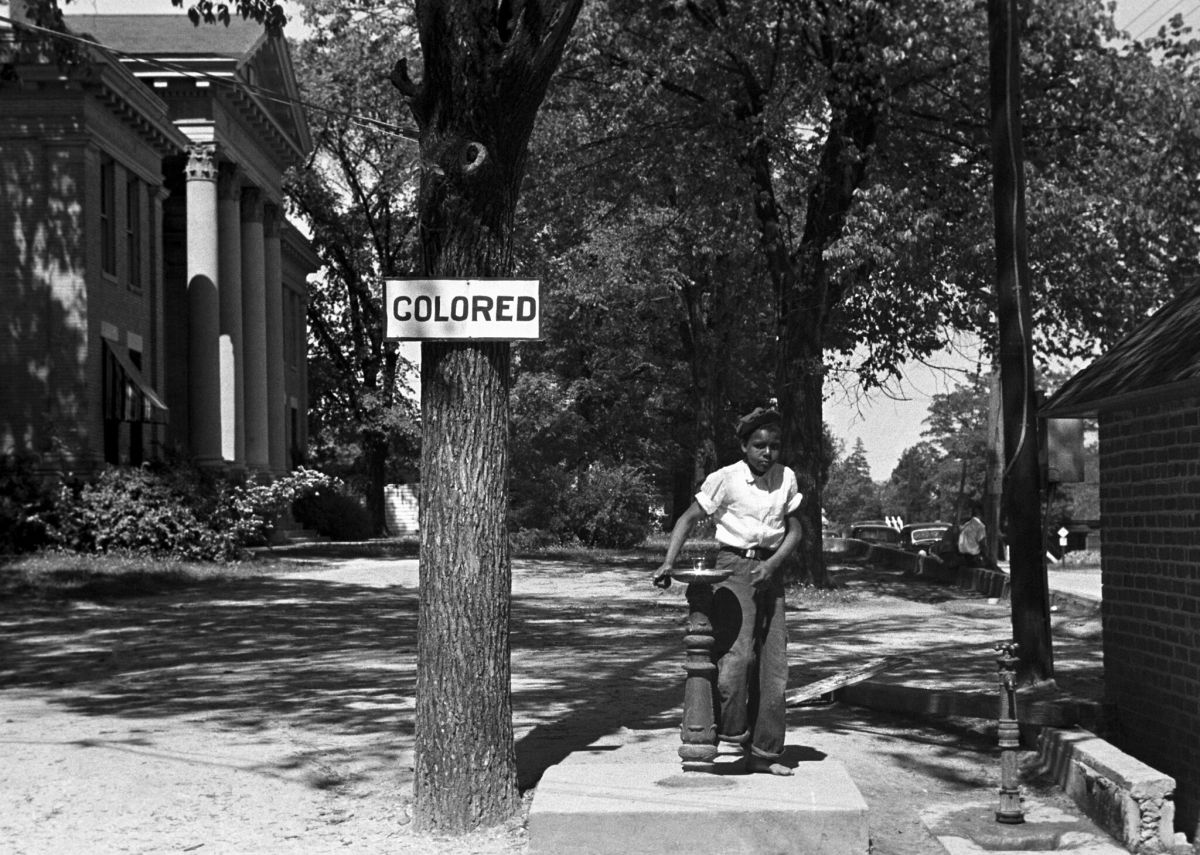A 2022 movie and book called “2,000 Mules” outlined what it maintained was credible evidence of a widespread effort by people — “mules” — illegally depositing ballots into ballot drop boxes to sway the 2020 election.
The film made a splash in conservative circles, where clips of the movie’s creator, Dinesh D’Souza, populated social media. Journalists from outlets including PolitiFact, roundly debunked its claims.
On May 31, with months until the next presidential election, Salem Media Group Inc., the company that produced the book and film, issued an apology — specifically for falsely representing Georgia voter Mark Andrews as having engaged in illegal voting.
“It was never our intent that the publication of the 2000 Mules film and book would harm Mr. Andrews,” Salem’s statement said, before announcing that the company had removed the film from its platforms and would no longer distribute the book or the movie.
The about-face didn’t come from nowhere. Andrews had sued Salem over the movie, arguing he’d been falsely accused of election crimes and the accusations led to threats against Andrews and his family. Salem settled the lawsuit for a “significant” undisclosed amount.

Salem Media Group released this apology May 31, 2024. (Screenshot from Salem Media Group.)
Salem’s settlement and apology made it one of a growing list of groups and people who’ve faced legal consequences, often from defamation lawsuits, for spreading election fraud falsehoods.
“Defamation law has been one of the rare successful tools in combating rampant, democracy-harming lies,” said RonNell Andersen Jones, a University of Utah law professor and First Amendment scholar. “Courts declaring that these were lies — and ordering those who told the lies to pay substantial damages — is a win in our ongoing battle for shared objective truth in a democracy.”
Here are eight other examples of the fallout from spreading 2020 presidential election misinformation.
1. Gateway Pundit, a conservative news website, declared bankruptcy amid defamation lawsuits: The Gateway Pundit’s parent company, TGP Communications, filed for bankruptcy in April, citing what it called “lawfare attacks,” seemingly a reference to the lawsuits.
PolitiFact and other news organizations have rebutted election falsehoods The Gateway Pundit promoted. The website is facing at least two defamation lawsuits — one brought by Georgia election workers and another by Eric Coomer, a former executive at Dominion Voting Systems, an election equipment company. Both lawsuits argue that The Gateway Pundit published false stories accusing the plaintiffs of election crimes.
In a statement posted online, Gateway Pundit founder Jim Hoft denied fault.
When contacted by PolitiFact, Hoft said his organization is “very proud” of its record; he also criticized PolitiFact and its coverage.
2. MyPillow CEO Mike Lindell ordered to pay $5 million: In 2021, Lindell launched a “Prove Mike Wrong” challenge, offering $5 million to anyone who could disprove that data he provided showed Chinese interference in the 2020 presidential election. Software developer Robert Zeidman took the challenge and found the data didn’t prove election interference. When Zeidman did not win the challenge, he filed for arbitration. An arbitration panel ruled in April 2021 that Lindell owed Zeidman $5 million plus interest. A federal judge affirmed that decision Feb. 21.
Dominion Voting Systems and Smartmatic, an election software company, both of which were the target of false election fraud claims, are also suing Lindell.

MyPillow chief executive Mike Lindell, speaks to reporters outside federal court in Washington, D.C., June 24, 2021. (AP)
3. Fox News settled Dominion Voting Systems defamation lawsuit for $787.5 million: Dominion Voting Systems sued Fox News for $1.6 billion, arguing the network defamed Dominion by broadcasting multiple false claims that its voting technology had rigged the 2020 presidential election.
The lawsuit settlement in April 2023 came hours before the trial’s opening arguments were set to begin. In a statement, Fox acknowledged “the court’s rulings finding certain claims about Dominion to be false.”
A few months later, the state of Oregon and New York City’s pension funds sued Fox Corp. for failing to uphold its duty to shareholders by persistently broadcasting 2020 presidential election falsehoods that opened the network to defamation lawsuits. That lawsuit is ongoing, as is another defamation lawsuit brought by Smartmatic.
4. One America News Network settled lawsuits related to election falsehoods: OANN, a conservative cable channel that pushed 2020 election conspiracy theories, has settled at least two defamation lawsuits since that year’s presidential election.
On April 24, OANN reached a confidential settlement agreement with Smartmatic.
In April 2022, OANN also settled a defamation lawsuit brought by Fulton County, Georgia, election workers Ruby Freeman and Wandrea “Shaye” Moss. In their lawsuit, Freeman and Moss said the network falsely claimed they committed fraud to alter the outcome of the election.

Wandrea “Shaye” Moss, a former Georgia election worker, is comforted by her mother Ruby Freeman, right, during her congressional testimony at the Capitol in Washington, D.C., June 21, 2022. (AP)
As a result of the settlement, on May 9, 2022, OANN ran a brief segment correcting the record about Freeman and Moss. In the segment, a narrator said that Georgia officials determined there was “no widespread voter fraud by election workers who counted ballots at the State Farm Arena in November 2020.”
The segment’s narrator said Freeman and Moss “did not engage in ballot fraud or criminal misconduct while working at State Farm Arena on election night,” and that the workers’ lawsuit had been “resolved to the mutual satisfaction of the parties” with an unspecified settlement agreement.
Chip Babcock, OANN’s legal counsel, told PolitiFact the network had published “newsworthy allegations” made by people like Giuliani and Trump “on a matter of public concern” — even if some of the more “incendiary allegations” of election fraud proved to be inaccurate.
Dominion Voting Systems filed a lawsuit against OANN that continues.
5. Rudy Giuliani ordered to pay $146 million over defamatory election claims: On Dec. 20, 2023, a federal judge ordered Giuliani, formerly a lawyer for former President Donald Trump, to immediately pay $146 million to Freeman and Moss for his defamatory claims that the pair had committed election fraud to benefit President Joe Biden. (The jury’s initial $148 million verdict was lowered.) A day later, Giuliani filed for bankruptcy, declaring his primary form of debt was multiple lawsuits, including the one brought by Freeman and Moss.
As their first lawsuit against Giuliani reached resolution, Freeman and Moss sued Giuliani again Dec. 18, 2023, arguing that he continued to make false statements about them. In May, Giuliani agreed to permanently stop claiming that Freeman and Moss “engaged in wrongdoing” during the 2020 election.

Rudy Giuliani speaks during a news conference after his defamation trial outside the federal courthouse in Washington, D.C., Dec. 15, 2023. (AP)
6. James O’Keefe and Project Veritas settled an election falsehoods lawsuit: A Pennsylvania postal service worker filed a lawsuit against conservative activist O’Keefe and Project Veritas, the organization he once led. Robert Weisenbach, the postmaster, said Project Veritas spread false claims that he had illegally backdated ballots.
In February, the lawsuit was “settled to the satisfaction of the parties,” according to Weisenbach’s lawyer. In a Feb. 5 X post, O’Keefe said “I am aware of no evidence or other allegation that election fraud occurred in the Erie Post Office during the 2020 Presidential Election.” Project Veritas shared a similar statement. O’Keefe was removed as Project Veritas’ chairman Feb. 19, 2023.
James O’Keefe and Project Veritas released these statements. (Screenshots from X and YouTube)
7. Sidney Powell faced Michigan fines, sanctions for spreading election lies: Courts ordered Powell, who was an attorney for Trump, and other lawyers who filed a conspiracy theory-filled lawsuit that sought to overturn the results of the 2020 presidential election, to pay more than $130,000 in legal fees incurred by those who had to defend against the lawsuit. A federal judge in Michigan imposed sanctions on Powell and the other lawyers in August 2021.
In October 2023, Powell pleaded guilty to several misdemeanors related to a high-profile election interference case in Fulton County, Georgia. Powell agreed to serve six years probation, pay a $6,000 fine, pay $2,700 to the Georgia secretary of state’s office and to testify truthfully at co-defendants’ trials.
Powell also faces lawsuits from Smartmatic and Dominion Voting Systems.

Sidney Powell, former attorney for former President Donald Trump, leaves federal court in Washington, D.C., June 24, 2021. (AP)
8. Newsmax settles defamation lawsuit with former Dominion Voting Systems executive: Coomer, the former Dominion Voting Systems executive, sued conservative media outlet Newsmax for amplifying false claims about Coomer manipulating votes in Biden’s favor.
On April 30, 2021, Newsmax and Coomer reached a confidential settlement agreement.
Newsmax apologized to Coomer on its website and in a broadcast.
“Newsmax has found no evidence that Dr. Coomer interfered with Dominion voting machines or voting software in any way, nor that Dr. Coomer ever claimed to have done so,” the statement said. “We would like to apologize for any harm that our reporting of the allegations against Dr. Coomer may have caused.”
Lawsuits that Dominion Voting Systems and Smartmatic filed against Newsmax continue.
Litigating election fraud falsehoods has limits
Although some election-related defamation lawsuits have yielded payouts and public apologies, experts said the U.S. legal system is not well positioned to fight misinformation.
Defamation law focuses on false statements about people or companies that “damage reputation,” said A.J. Bauer, a University of Alabama journalism and creative media professor. That’s a narrow category and there are “few legal mechanisms to combat falsehoods beyond the individual scale,” he said.
Already, Bauer said he’s seen a shift in election misinformation: “By keeping election denial vague and nebulous they avoid legal punishment while perpetuating distrust in democratic systems. This isn’t going away any time soon.”
PolitiFact Researcher Caryn Baird contributed to this report.
RELATED: Dominion Voting Systems’ defamation lawsuit against Fox News: What to know before the trial


